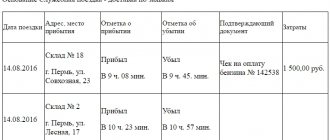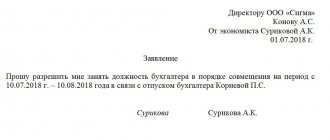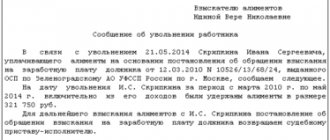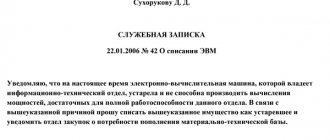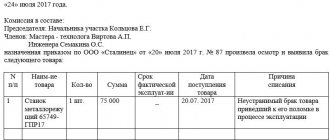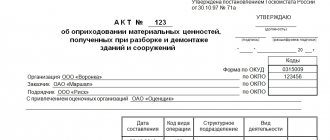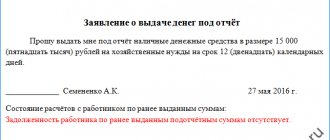Acts - samples and examples
A memo about an employee’s boorish behavior is an informational document that is written to senior management and indicates the employee’s inappropriate behavior.
You will learn how to draw up such a paper from our article. REPORT No. 3 08/25/2016 About the inappropriate behavior of an employee I would like to bring to your attention that on 08/24/2016, the foreman of the territory’s landscapers was V.I. Zaikovsky. Incorrect behavior was committed towards the deputy head of the administrative and economic department, Antonina Pavlovna Finogenova. Zaikovsky V.I. made an insensitive remark regarding A.P.’s appearance.
Finogenova, adding insult with obscene expressions. It should be noted that this is not the first rude statement by V.I. Zaikovsky.
"Personnel Affairs" magazine, Subscribe to the magazineDelegating part of the manager's powers to another company official, for example, the deputy director for general issues, can significantly reduce and optimize the time spent on paperwork and other daily affairs of the personnel service.
Let's see how to correctly formalize the delegation of authority (with the right to sign personnel documents).
An act is an information and reference document that is drawn up to confirm established facts, events or actions.
– violation of labor discipline and non-compliance with internal labor regulations; – refusal to sign indicating familiarization with the order; – refusal to give explanations regarding violation of discipline;
– delivery and acceptance (of work, material assets, documents)*(1); – acceptance and delivery (of material assets, documents); – transfer and reception (cases, documents); – surveys (state of safety, fire safety, working conditions, performance results);
Be a witness!
Acts are drawn up not by one person, but by several. This is explained by the nature and purpose of this document. Firstly, it is necessary to state the facts and phenomena of the surrounding reality in front of witnesses, otherwise it will subsequently be very difficult to prove that the event described in the act actually happened.
Secondly, important decisions are often made on the basis of acts that can be challenged in court, especially if they affect the rights of workers. If it is determined that the act does not meet the requirements for documents of this kind (for example, it was drawn up without witnesses or not in the form), the court will simply not take it into account.
And the event that is recorded in it, in the absence of other evidence, can be considered not to have occurred. Imagine your disappointment when a judge considers the fact that an employee skipped work or showed up at work in a state of intoxication to be undetermined only because the report on this was drawn up improperly!
Some acts must be issued by a specially created commission, the composition of which is approved by order of the head of the organization. We are talking about acts of acceptance and delivery of material assets, documents, files, as well as acts of audit, inventory * (1), investigation of accidents, industrial accidents * (2) (Article 230 of the Labor Code of the Russian Federation).
As a rule, there are forms established by law for them. Other acts are drawn up in any form. The main condition here is to find precise wording to correctly reflect the event in the act.
The most common official misconduct: – untimely or poor-quality performance of duties stipulated by the employment contract or job description; – untimely or poor-quality execution of tasks, instructions, orders from management; – absenteeism; – showing up at work in a state of intoxication.
Act on the absence of an employee from the workplace
Act on the employee’s absence from the workplace (sample 2) Act on refusal to give explanations regarding being late for work Act on refusal to give explanations Act on violation of labor discipline and non-compliance with internal labor regulations Act on failure to provide a written explanation by the employee Act on refusal to sign a dismissal order Act on the employee’s refusal to certify entries in the work book and to receive the work book in hand; Certificate of medical examination for intoxication
Group accident investigation report
Report on industrial accidents Report on industrial accidents
Act on transfer of work book
An act on the employee’s refusal to certify entries in the work book and from receiving a work book in hand. An act on writing off work books. An act on the destruction of forms of work books and inserts for them. An act on the destruction of documents with an expired storage period. An act on the destruction of seals.
We compose correctly
Now let’s look in detail at the rules for drawing up acts of violation of labor discipline. It was not by chance that we stopped at these documents, because they invariably accompany the procedure for imposing any disciplinary sanction, be it a reprimand, reprimand or dismissal (Article 193 of the Labor Code of the Russian Federation).
And they are most often compiled by personnel service employees or heads of departments in the presence of personnel officers. There is no established form for these acts, but there is an established practice for preparing such documents.
The act of violation of labor discipline must indicate: 1. Date, place and time of preparation. If the act is drawn up on the occasion of being late or absenteeism, then the time must be indicated in it accurate to the minute. 2.
Example
“By me, HR department specialist Vasilyeva S.Yu., in the presence of the head of the distribution department Nikolaeva E.P., senior legal adviser Shvetsov O.I. This act has been drawn up regarding the following.” 3. In the presence of whom the act was drawn up.
The surnames, initials and positions of the witnesses are indicated here (it is advisable to invite at least two people and preferably not from the department where the offender works). 4. What specific violation was committed by the employee.
Example
“October 4 at 14:00. storekeeper Trushkin I.M. was at work in a state of intoxication.”
Example
“October 4 at 17:00. accountant Leonova M.M. was absent from work for four hours (from 14.00 to 17.00) without good reason.” 5. Preliminary explanations of the offender. Explanations must be written down verbatim, of course, excluding obscene expressions (if the employee used them in his explanations, a note is made about this). 6.
Signatures of witnesses present during the drawing up of the act. 7. Signature of the author of the act. 8. The employee’s signature indicating that he has read the act. The employee must be familiarized with the act against receipt. If he refuses to sign the act, an appropriate note must be made about this, under which the compiler and witnesses once again put their signatures.
A report stating that an employee appears at work while intoxicated is drawn up on the same day and presented for review the next day. In this act, it is necessary to describe in detail the external signs indicating alcohol, drug or other toxic intoxication.
We invite you to familiarize yourself with: Inventory of property for the apartment rental agreement
In the act of refusal to give explanations, it is necessary to describe what violation of discipline the employee refused to explain and how he motivated his refusal. By the way, this act does not need to be issued in the form of a separate document, but the refusal to explain and the motivation for the refusal can be recorded in the act of violation of discipline.
How to draw up a deed
To draw up the act, use the general form of the organization or a special form of the act with a unified text. A special form is taken when the act has an approved form (for example, a report on an industrial accident) or when it records periodically repeated information (as, for example, in acts of violation of discipline).
The acts are subject to the requirements of GOST R 6.30-2003*(3). In accordance with this GOST, the mandatory details of the act are: – name of the organization; – name of the document type (the word “act”); – date and registration number of the document;
– place of compilation; – title to the text (name of the act); – signatures; – where necessary – approval stamp. It is usually present on legally established forms of acts. In addition, it is placed on acceptance certificates for completed construction of objects, equipment, work performed, write-offs, and examination.
September 30, 2009
“Personnel Affairs”, N 10, 2004
Code of Ethics
Business communication implies the principles and norms of business etiquette aimed at achieving mutually beneficial results. Regardless of the position and functions of the employee, he must be able to clearly express and argue his own thoughts, analyze the thinking of his partner, and form a critical attitude towards relevant opinions and proposals.
As examples of business communication show, a prerequisite is to conduct a conversation and adjust its process, the ability to listen to the interlocutor, persuade and exert a positive influence, create a favorable atmosphere conducive to productive activity and the elimination of conflict situations, while maintaining the norms of professional ethics.
Intonation is of primary importance during a telephone conversation, especially at the beginning and end. Any speech errors, procrastination, or stuttering cause tension or irritation in the interlocutor. And if the tone does not match the content of the information, the interlocutor is inclined to trust the intonation.
Before calling, you should formulate the task as briefly as possible and make the necessary notes. After connecting, you need to introduce yourself, indicating your name and company name, and then check with the interlocutor whether he has enough time.
Of course, regardless of your emotional state, you should avoid inappropriate behavior in such a way as to openly express your own emotions. But excessive politeness in the form of lengthy thanks can cause impatience and irritation in the interlocutor.
Unusual examples of business communication that require careful preparation include cases where the caller needs to be reminded of himself after a long absence, as well as to offer a service to various types of clients whose preferences are unknown.
The Code of Ethics and Official Conduct is drawn up on the basis of the Constitution of the Russian Federation and is developed in accordance with the principles of professional ethics and rules of conduct for an employee, which he is obliged to study when applying for a position.
The Code of Ethics and Service Conduct shapes relationships within the workforce. It regulates such concepts as conflicts of interest within the company, abuse of power, data confidentiality, personal integrity, adherence to the principles of healthy competition, and much more. Any citizen of the Russian Federation has the right to expect employees to behave in accordance with their professional ethics.
Act on boorish behavior of an employee in the workplace
Only after this can you begin to compile the document itself.
- The first person paper is drawn up on a standard A4 sheet. You need to write in short and clear sentences, without ambiguity and grammatical and spelling errors.
It is imperative to refer to the current legislation - after all, such behavior is officially prohibited by law and this way you will show that the person who insulted you violated the law.
- Make sure that the report is accepted - through the office or personally by the boss.
- After this, wait for the manager’s reaction - it will definitely follow.
- There is no need to be afraid to defend your honor and dignity. Your worst enemy is ardor and ignorance of the basics of legislation.
- The reasons that prompted the report, in this case, were the boorish behavior of the employee,
- Analysis of the insult that occurred,
- Conclusions,
- Suggestions for resolving the situation.
The memorandum is drawn up on an A4 sheet or on a form prepared according to a certain form.
According to the concepts of office work, it consists of several parts:
Sometimes the last part is missing, and instead there are demands for action.
Also, a note, like any document, must have details.
If this is an internal document, then it is necessary to indicate in the report:
- The name of the structural unit from which the report was made,
- The name of the document itself,
- Date of formation,
- Applicant details – full name, position,
- Next comes the text and heading “About rudeness (boorish behavior) in the workplace” or “About insult at work”, in the text it is necessary to specify the actions of the offender and indicate why they were perceived as an insult,
- Signature with transcript.
If you submit a report form to higher authorities, you must:
- Indicate the name of the recipient organization,
- Registration number,
- Locality and place of compilation.
Important: when preparing a document for external submission, you must use a special form.
Department of Statistical Accounting
To the Director of Almaz LLC
Memo 2.09.2017 No.22
About workplace harassment
I draw your attention to the fact that the head of the department, Gavrilyuk L. B., on September 02, 2020, used obscene language in the workplace, humiliated her by pointing out her belonging to different social strata, which was offensive, and directly threatened her.
I ask that the head of the department, L. B. Gavrilyuk, be held accountable.
Statistician of the statistics department Antonets I. I.
When the conditions under consideration occur, the subject, first of all, must be familiar with the concept of inappropriate behavior within the framework of professional relationships in order to correctly interpret it on the part of a colleague.
Despite the availability of information about boorish behavior in the legislation, as well as the provided liability for allowing such behavior, the assessment of unlawful statements addressed to an employed subject still remains an extremely subjective category, which legislation cannot fully regulate.
In accordance with the provisions of Art. 5/61 of the Code of Administrative Offenses of the Russian Federation, incorrect behavior of an employee is understood as the public expression of his opinion, which humiliates the honor and dignity of a colleague involved in joint work activities. This article also provides the following:
- In the case where any employed person allows himself offensive expressions, that is, expressions that entail humiliation of the honor and dignity of his colleague, this may lead to liability in the form of fines. Thus, the sanction for the offender will be from 1 to 3 thousand rubles, for officials - from 10 to 30 thousand rubles, and for a company - from 50 to 100 thousand rubles.
- In conditions where the insult occurs as part of a public speech, report or other public event, or as publications in the media or in any printed publications, this may attract the offender to a fine of 3 to 5 thousand rubles, from 30 to 50 thousand rubles. for officials, as well as from 100 to 500 thousand rubles. − for the company.
- In circumstances where officials or the company have demonstrated insults or humiliation to the dignity of any employee, this will also be regarded as grounds for liability. Thus, for public officials the fine will be from 10 to 30 thousand rubles, for companies - from 30 to 50 thousand rubles.
However, it is important to understand the subjectivity of statements and the fact that personalization is not yet an insult to a person’s dignity. For example, if a manager, faced with the incompetent work of a subordinate, concluded that he made a “stupid decision,” this cannot be regarded as a humiliation of a person’s dignity.
In this case, the manager did not use any taboo expressions, which means there are no grounds for holding him accountable. However, if a subordinate begins to argue with the boss, defending his point of view in an inappropriate way, then incorrect and boorish behavior can be observed in the subordinate.
We suggest you read: How to fire an employee for theft of the Labor Code of the Russian Federation
Practice demonstrates that boorish behavior towards a citizen is appropriately understood as personal insults using obscenities or jargon. An obvious insult, which cannot be justified in any way, is considered to be an abusive and obscene characterization of a subject, aimed at undermining his reputation as an employee, devaluing his work, outright mockery and “bullying.”
Due to the employee’s boorish behavior, the memo is of a notification and informational nature, which determines its content and content. At the same time, the text of the paper must also contain a recommendation text or a request to take action against the offender (to bring him to justice).
Thus, the required paper details include the following items:
- The full name of the addressee or his full name, the designation of the position and department where the subject works is also required.
- The date the document was generated, as well as its serial number. It is understood that when transferring the paper to the manager's secretary or to the personnel department, the document will be registered as internal mail.
- The main text of the document, which will disclose the reason for the application, as well as the reasons that led to such a need.
- The applicant’s signature with a transcript, as well as the position of the subject and the department where he works.
The main requirements for any memorandum, including a paper on inappropriate behavior of an employee, are completeness and brevity. It is assumed that the text of the document should fully disclose exactly what reasons provoked such behavior of the offender.
Practice demonstrates that if an official displays boorish behavior, he can not only speak rudely to a subordinate, humiliating his dignity, but also shorten the lunch break (or eliminate it altogether), increase the workday, or deprive the subject of a bonus.
This in itself is not boorish behavior, but it represents a direct violation of the employee’s rights provided to him by the Labor Code of the Russian Federation. However, if in such circumstances the official also allowed himself to express himself offensively, then the subordinate has the right to count on compensation for moral damage and an apology. For this purpose, a memorandum is drawn up.
It must be emphasized that when preparing a report, it is extremely important to comply with the general requirements of professional etiquette and business writing style. The use of emotional expressions and calls for various actions of a categorical nature is strongly discouraged, for example, “Can you impose a fine on my offender?
"or" I ask you to fire Ivanov I.I. for inappropriate behavior towards me." It is understood that the report is an informational tool, not an administrative one. The final decision is made by the employer on the basis of the paper drawn up independently.
It's good when being at work is enjoyable. However, even a favorite job can be overshadowed by people who are not burdened with knowledge of etiquette. Clients, co-workers, partners, bosses - these are the main culprits when it comes to harassment in the workplace.
We will tell you in this article what to do, how to resist and respond to insults at work.
Many people, when confronted with abusers, threaten the offenders with criminal punishment. Such a threat can only be considered inertia.
Since 2012, the Criminal Code punishes only insulting a person in power. All others should contact the Administrative Code.
Article 5.61 of the Code of Administrative Offenses speaks of insult in general. The official situation of this offense is not considered in any separate section of the article.
What exactly can be considered an insult? Two things are important here:
- the offender seeks to humiliate the dignity and/or honor of his victim;
- the actions of the perpetrator are clothed in some indecent form, that is, they “do not suffer” from the ethics of words and/or actions.
Such an offense must have a perpetrator and an addressee. This can be explained with a simple example.
Let’s assume that a client came to the company’s office with complaints and contacted an available manager. The issue was considered, but it was not immediately possible to resolve the problem.
Here it is rational to turn to sociological research. They identified the offending factors empirically. The following may be considered offensive:
- all obscene or obscene expressions (usually swearing, swearing);
- various comparisons - for example, with animals or objects;
- unwanted, cynical touching;
- obscene gestures;
- movements that may result in clothing or part of it being torn off from the victim.
Recommendations for design
Like any business document, a memorandum must fundamentally comply with the requirements set out in GOST 6.30–2003 “Unified documentation systems. Unified system of organizational and administrative documentation. Documentation requirements."
IMPORTANT! If this document is drawn up incorrectly, it may be considered legally unreliable and, thus, will lose the force of evidence when resolving controversial issues.
We prepare an internal report
The internal memorandum can be written or printed on a regular A4 sheet. No special form is required for this. Details that are accepted for this type of internal documentation:
Sample memo about inappropriate behavior of an employee
Be a witness!
Example
Example
Example
How to draw up a deed
September 30, 2009
General Director of LLC "Sheep Hunting"
Litvin Artur Kirillovich
from the design engineer of the production department
Fedorenko Inna Evgenievna
DOCUMENTAL NOTE
(about workplace harassment)
I would like to inform you that today, January 26, 2019, senior engineer, head of the production department, Alexey Nikolaevich Matyushin, allowed himself insulting and humiliating expressions addressed to me in front of the entire department, using obscene language in his derogatory remarks addressed to me personally.
At the same time, A.N. Matyushin aspects of the relevance of my employment in the company and the general importance of my work for engineering projects were also rudely touched upon, in fact, some of those present could not contain their mocking chuckles.
Based on Art. 5/61 of the Code of Administrative Offenses of the Russian Federation, insult is usually understood as boorish and gross humiliation of the personal dignity of any employed citizen of the Russian Federation within the framework of professional relations.
I ask you to take appropriate measures regarding A.N. Matyushin.
01/26/2019 Fedorenko I.E.
Thus, a report on the boorish behavior of a company employee, provided to the head of a business entity, is an effective tool in combating the unlawful behavior of the entities. When compiling it, the offended person must familiarize himself with the normative regulations on this issue, especially those containing the concept of boorish behavior.
We invite you to read: How to transfer money to a VTB World 24 soldier card
Such rules are contained in Part 7 of Article 59 of the Law of July 27, 2004 No. 79-FZ. The inspection is carried out jointly by:
- personnel service,
- legal (legal) division,
- trade union.
This is stated in part 4 of article 59 of the Law of July 27, 2004 No. 79-
Federal Law. A civil servant who is directly or indirectly interested in its results cannot participate in an internal audit. In this case, he submits an application for exemption from participation in the inspection.
Grounds: Part 5 of Article 59 of the Law of July 27, 2004 No. 79-FZ. The employer's representative is obliged to monitor the timeliness and correctness of the internal inspection (Part 3 of Article 59 of the Law of July 27, 2004 No. 79-FZ).
The memo about inappropriate behavior is intended to notify the manager of the current situation. This, in particular, determines its semantic content.
It is appropriate to include a text of an advisory nature in the note, or record a request to take action against the violator. It is not recommended to tell the manager exactly what decision he needs to make.
You should also know that the mandatory points of the document in question are:
- Complete information about the addressee. It is necessary to indicate the position of the manager (or head of the department where the offender works) and his full name.
- Date of generation of the report, its serial number. It is assumed that when sending a paper to the personnel department or secretary, the responsible entity registers the paper, assigning it a serial number.
- Main text. In this block of the document, the compiler must describe in as much detail as possible the reason for issuing such a note, as well as reflect the facts of the offensive behavior of the company employee.
- Signature of the author of the document with transcript.
How to write correctly: forms, samples, examples
The text of the report may be free. There is no single form. It is necessary to state the situation, describing as many details as possible. The main thing is that it contains all the necessary facts of violation and attributes of business document flow. The registration is done according to the GOST 6.30–2003 standard: a sheet of A4 paper, all the required details.
Boorish behavior, insulting employees and clients
The report on the rudeness of a particular employee must include the following parameters:
- name of the addressee indicating the specific position, department and full name;
- date and outgoing paper number (the document can be registered as internal mail of the organization);
- text of the note;
- Date of preparation;
- the applicant’s signature and its transcript indicating the position and department.
Failure to fulfill official duties
The memorandum of failure to fulfill official duties contains the following components:
- addressee's name;
- document title (centered);
- the date when the paper was drawn up and the number;
- the text of the note reflecting the list of duties that the employee does not perform properly and the consequences that occurred as a result;
- proposals regarding the measure of responsibility that will be applied to the employee;
- signature and position of the applicant.
Absenteeism and tardiness
The report on absenteeism or tardiness shall indicate:
- the name of the department to which the employee (absent from work) belongs;
- Full name of the manager and his position;
- title;
- text containing the fact and time period of absence from the workplace;
- proposal for disciplinary action;
- position of the server, his signature and transcript.
Peculiarities of preparing a report on an employee’s boorish behavior
Incorrect behavior implies:
- offensive remarks addressed to colleagues and clients of the company;
- use of profanity in conversation;
- rudeness, abuse of authority, intrusive behavior;
- tactless gestures towards colleagues and clients.
Also, inappropriate behavior of an employee includes violating the established dress code of the organization and wearing inappropriate clothing.
how to react to received information, what measures to take, including disciplinary punishment, punishment and dismissal. Its consideration can be called the responsibility of management. This is the general procedure for considering an appeal.
There are many cases when a report is written, for example: failure to fulfill official duties, inappropriate behavior. The reasons and form of writing are not regulated in legislative acts.
Usually written in cases:
- the presence of industrial or administrative disputes - if management intervention is necessary to resolve;
- manifestations of employee initiative to improve the company’s activities and production process, for example, to make rationalization proposals;
- if an employee disagrees with a management decision that is controversial, in his opinion;
- in the presence of a long-term conflict situation - to express one’s position;
- creating a report on any stage of activity - to report on the results of the work;
- violation of labor discipline by an employee, for example, refusal to perform his duties, to attract the attention of management;
- improper delegation of authority - to ensure management responsiveness;
- incidents that resulted or could result in harm to employees or material damage to the employer’s property;
- achievement of significant results by the employee, to which management needs, in the opinion of the middle manager, to pay attention, for example, to reward the employee for successful work.
Specifics of the report
This type of official information, unlike other types of notes, is addressed exclusively to higher positions, authorized persons, superiors - that is, people who make real decisions. The information contained in such a note is precisely intended to bring to life some kind of action, which one depends on the purpose of the report and the information and proposals contained in it.
Difference from a memo
The report is intended to convey information “vertically”, and the memo transmits information between employees of equal status. Unlike a report, a memo is not provided for by OKUD. Written by the employee of his own free will.
Difference from an explanatory note
The explanatory note is also sent “vertically”, but is fundamentally different in the purpose stated in the very title of the document: to explain this or that current situation in order to resolve the issue of the employee’s guilt or innocence. That is, as in the report, a representative of a higher position is encouraged to make a decision, but this decision concerns only disciplinary violations. OKUD has its own code, just like the report. Written at the request of management.
NOTE! The memorandum, depending on the circumstances, can be written on one’s own initiative or at the direction of authorized persons. This document has legal force.
Is conflict at work a reason for disciplinary action?
About violation of labor discipline (absenteeism) I hereby bring to the attention of management that the day before yesterday, November 4, 2016, an employee of the HR department, Tatyana Olegovna Valeryeva, committed a gross violation of labor discipline.
After the lunch break, which ended at 14:00, she did not return to her workplace and was absent until the end of the working day (from 14:00 to 18:00). Supporting documents and satisfactory explanations for his absence T.O.
Valerieva did not provide it over the next two days. In connection with a gross violation of labor discipline, I propose to declare T.O. Valerieva is reprimanded and entered into her personal card. Head of Human Resources (signature) R.V.
- An insult contained in a public speech, a publicly displayed work or the media shall entail the imposition of an administrative fine on citizens in the amount of three thousand to five thousand rubles, on officials in the amount of thirty thousand to fifty thousand rubles, on legal entities in the amount of one hundred thousand. up to five hundred thousand rubles.
- Failure to take measures to prevent insult in a publicly displayed work or in the media entails the imposition of an administrative fine on officials in the amount of ten thousand to thirty thousand rubles, on legal entities in the amount of thirty thousand to fifty thousand rubles.
- But the fact is that different people have different approaches to this. For example, a boss, having learned about, to put it mildly, unqualified behavior of his subordinate, told him what he thought and called his actions stupid.
If the events specified in the complaint were not confirmed at all (they were completely refuted by the investigation materials), then in the response to the complaint it is necessary to indicate: “Your appeal has been considered, for which a commission has been created to conduct an internal investigation.
The team is divided into 2 camps, half are afraid of losing their jobs, so they remain silent.
And what can we do, she works in the store, her son and the woman with whom he lives are a family clan.
Everyone doesn’t like this, because we suspect them of fraud. What is the best thing to do, what should we do to remove her from her position, since we don’t trust her.
Recommendations for design
The report on violation of labor discipline was assigned code 0286041 according to OKUD .
The document can only be of an informational nature; it provides information about the process of performing various works or the completion of events.
The reporting report notifies about the process or completion of the assigned tasks, assignments, instructions, and special work. By this, it ensures communication between the subjects of governance at the vertical level - from bottom to top - and is directed from a lower-level official to a higher-level one.
Depending on the address, notes can be:
- Internal - sent to the head of a structural unit or organization (in any form, no form required);
- External - addressed to higher authorities or governing structured bodies (mandatory on the organization’s letterhead).
The document must be clear and structured and must not contain:
- manifestations of feelings or emotions;
- unnecessary information that does not relate to the essence;
- errors or lack of mandatory information that may cause the document to be invalidated.
You should not submit a report to management if:
- there is a personal hostility;
- there is no evidence of the incident;
- the kurtosis is not of a large degree and did not affect the efficiency of labor at all;
- the conflict situation was corrected in time.
Insult in the workplace: article, punishment, complaint, report
For inappropriate behavior, disciplinary punishment is provided in the form of a reprimand or reprimand. Dismissal is not permitted in this case, since the actions are not of a one-time serious nature.
If, prior to this, a disciplinary punishment has already taken place against this employee within a year, then a repeated reprimand may lead to dismissal, although his offense falls into another category of violations.
The official investigation does not insist on indicating the expressions that were used against the injured party. And if the case is taken to court, then such details should be confirmed, supported by facts with the help of witnesses.
Responsibility of the employee for this behavior
An employee who indulges in this behavior towards staff or clients can usually be subject to disciplinary action or a reprimand.
Important! It is impossible to immediately dismiss an employee for this violation, since it is not a serious violation, but if these facts are repeated, extreme measures can be applied.
These violations can be regarded not only as non-compliance with the Labor Code, but also with the Civil Code, if there is a fact of insult or slander.
Two parties have the right to go to court, the victim and the employees.
If the person who allowed himself to be treated incorrectly in the team holds a leadership position, then the employees can file a lawsuit against the organization itself by collectively signing the claim.
Structure of a report for an employee
a note about an employee’s boorish behavior, like any other report, should include:
- information about the author of the document,
- information about the recipient of the document, the employee to whom it is addressed,
- description of the essence of the disciplinary offense,
- the compiler's recommendations to management regarding subsequent personnel decisions.
The report must indicate the date the document was generated, as well as the signature of the originator.
Drawing up and filing a claim
A complaint about an employee’s boorish behavior is usually called a report.
Any employee of the enterprise who has witnessed the inappropriate behavior of a colleague or who has suffered from its manifestations has the right to draw up and submit a report on the boorish behavior of an employee.
In addition, along with the report, an act may be submitted stating that a specific employee of the organization showed a boorish attitude towards colleagues and clients of the company.
The rules for drawing up and submitting a memo are no different from drawing up other claims initiated by a violation of work ethics. It must contain the following information:
- Details of the person to whom the note is sent, as well as the name of the institution (for example, the director of UralSib LLC, Sidorov I.I.);
- Details of the initiator of the report submission (full name);
- The title of the document, namely “Memorandum”;
- The main part describes the situation (indicating the exact date and time) in which inappropriate behavior of a specific employee was recorded (indicating his details). It is important to point out here that such employee behavior is recorded on a regular basis and is the “norm” for him.
- In the “Requirement” part, you should indicate a request for the application of appropriate punitive measures in relation to the employee, in view of the disciplinary violations committed by him (based on the collective agreement or the “Internal Rules of the Labor Organization”;
- At the very end, the date of filing the note, initials and personal signature of the applicant are indicated.
The compiled memo is handed over to the head of the organization, after which he announces the beginning of an internal investigation, which is accompanied by an interview with the most negligent employee, as well as other colleagues (witnesses of boorish behavior). Upon inspection, the manager makes a decision on the application of disciplinary punishment.
Satisfaction of the claim by the court
In addition to the expected punishment under the Labor Code, it is possible to apply paragraphs of Article 152, which reflects the procedure for protecting business reputation.
The lawsuit will be satisfied under the following conditions:
- recognition of a violation of the code of ethics and official conduct;
- the information disseminated concerns the issue of honor;
- discrepancy between information and reality.
In this case, the plaintiff is obliged to provide evidence of the facts of the insult, and the defendant is obliged to confirm what is true.

